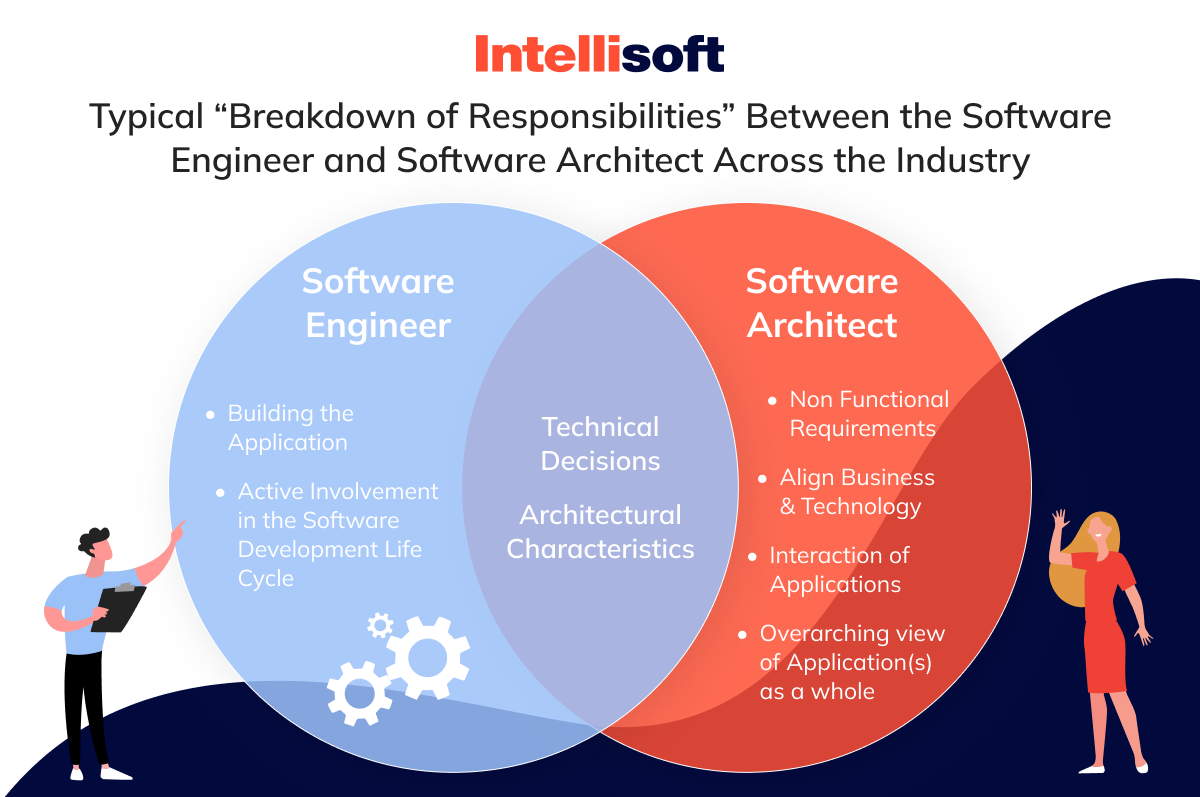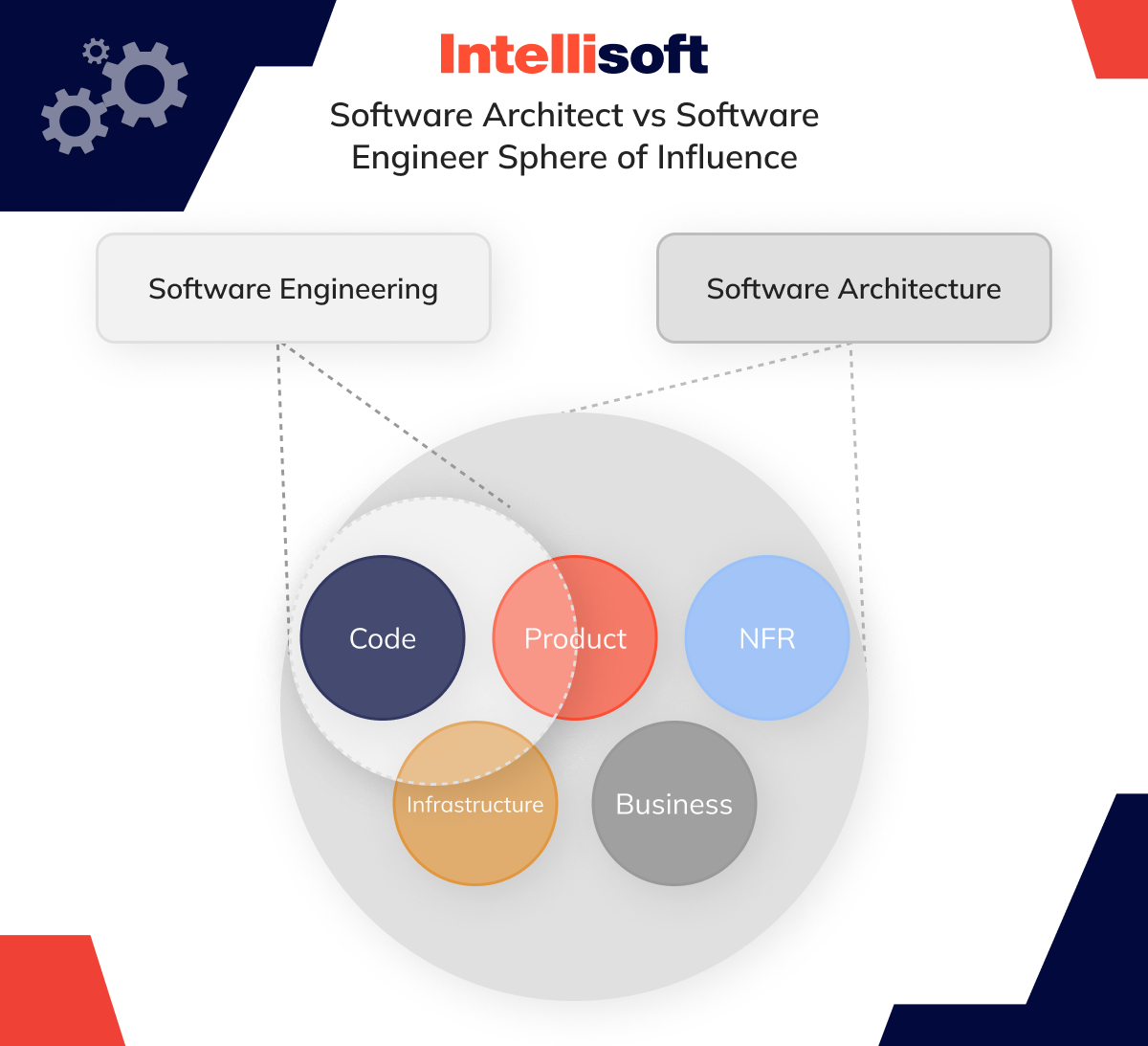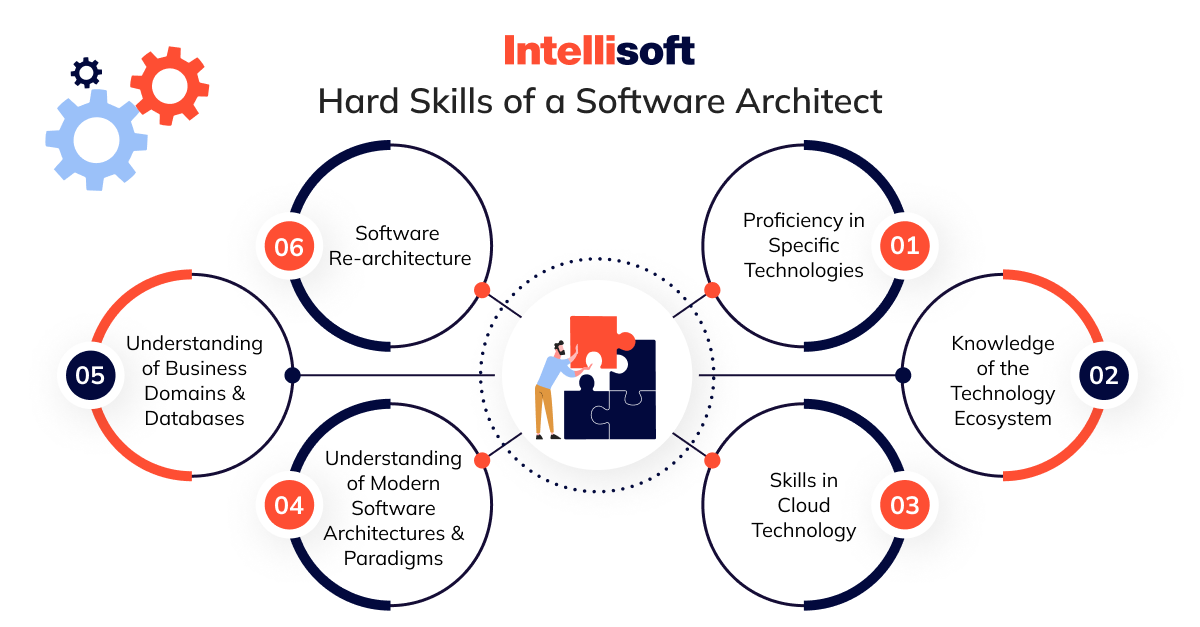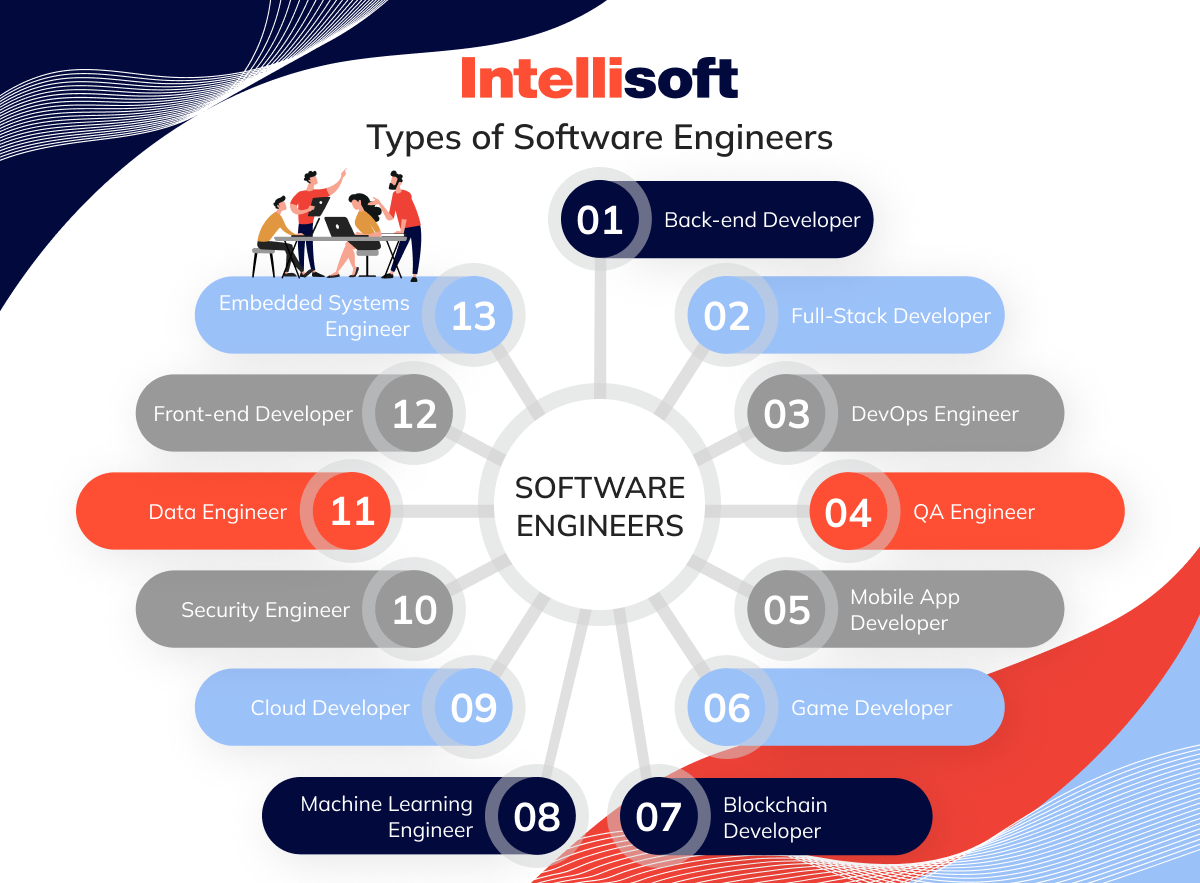You can take different technological routes to create something big for your application development project. On one side, you have the precise world of software engineering. On the other, the creative expanse of application development. Though the paths of software architect vs software engineer may appear similar, each leads to unique challenges and opportunities. At IntelliSoft, we have years of experience navigating this complex landscape and are here to help you understand the crucial roles played by solution architects and engineers.
Software architects and engineers shape the tech arena. A solutions architect designs the strategic framework, dreaming up vast structures in the digital world. Meanwhile, an engineer brings these dreams to life, ensuring that every line of code contributes to robust, functional application on multiple platforms.
Why is this distinction between a solutions architect vs software engineer important? Understanding whether your project requires the visionary skills of an architect or the meticulous precision of an engineer can be the key to its success. Let’s explore these roles further and see how selecting the appropriate expert can transform your technological projects from mere ideas into tangible innovations.
Table of Contents
Software Architect vs Software Engineer: A Comparative Overview
When planning an application development project, one of the initial challenges many organizations face is deciding whether to go with solutions architect vs software engineer approach. Surprisingly, this dilemma is quite prevalent in the tech industry, and the answer is not as black and white as it might seem.
Software architect vs software engineer is not a battle. They are both integral to the development lifecycle. However, their contributions vary greatly in nature and impact, depending on the project’s requirements. The choice of which professional in the solution architect vs software engineer dilemma is “better” for your project largely depends on the current stage of development and the objectives you aim to achieve.

Software Architects: The Visionaries
Software architects could be compared to master planners in building and urban planning. They are responsible for designing the high-level structure of systems, ensuring that the overarching framework meets both technological and business needs. They are crucial in making decisions that steer the overall project direction, selecting suitable technology stacks, and guaranteeing scalability, performance, and security. They tackle abstract problems, often finding solutions that reconcile system capabilities with business objectives.
Software Engineers: The Builders
Conversely, software engineers are the builders. They take the plans devised by software architects and turn them into reality. This role is hands-on and deeply involved in the coding and development process. Daily, application engineers address practical challenges, focusing on coding, debugging, and executing the detailed plans laid out by architects. They ensure that each app component works as intended and that the application performs optimally under various conditions.
Determining Who You Need
To ascertain whether a software architect or an engineer is more suitable for your project, consider your development cycle’s specific stage and requirements. A solutions architect will be indispensable if your project is in the initial phases, where making strategic decisions about architecture, scalability, and technologies is crucial. They establish the groundwork for future development, ensuring the foundation is robust, adaptable, and aligned with long-term objectives.

Software engineers become essential as the project progresses to the middle and later stages, focusing on building and implementing the designed solutions. Their coding, troubleshooting, and optimization expertise is crucial as they transform architectural blueprints into operational applications. Certain projects might have unique requirements that tilt the need towards one type of expertise over the other in the solutions architect vs software engineer equation.
For example, projects that demand extensive upfront architectural planning to tackle complex data or integration challenges may benefit more from a solution architect’s strategic input. On the other hand, technically intensive projects requiring detailed development might need a larger team of skilled software engineers.
Choosing between a software engineer vs architect is not about deciding who is better overall. You need to identify who is right for your project’s specific needs and current phase. This decision can greatly influence your development projects’ efficiency, cost, and ultimate success. By aligning your project with the right professionals, you can optimize every stage of the development process for success.
The Role of a Software Architect
On the application development scene, the role of a software architect is both critical and profoundly influential. Charged with the high-level planning and organization of projects, solutions architects establish the foundations for effective and efficient systems. Although they typically do not engage directly in coding, their strategic decisions significantly influence the project’s direction and ultimate success.
Importance of Having a Software Architect
Software architects make an immense contribution to strategic planning. They envision the overarching structure of a system, ensuring it aligns perfectly with business goals. This vision involves choosing the right tools and technologies, decisions that crucially affect the project’s success. For instance, selecting between different mobile technology stacks can have a major impact on the functionality and performance of a mobile application.
The selection of tools goes beyond personal preference, addressing crucial aspects of project feasibility and future scalability. The software architect’s choices regarding advanced CAD (Computer-Aided Design) and PLM (Product Lifecycle Management) solutions, such as Tristar, determine how information and processes are managed throughout the development lifecycle. This decision affects not only the development phase but also the maintenance and scalability of the application after deployment.
Standardization and Communication
Software architects set coding and development standards that ensure consistency and quality across the project. These standards provide a clear code quality and system performance benchmark and guide the engineering team’s efforts. Additionally, solution architects act as a bridge between non-technical stakeholders and the engineering teams, translating business requirements into technical specifications. They organize the workflow into specific epics and user stories that guide the development process.
The role of solution architects differs from project managers or product owners, who focus more on timelines, budgets, and market needs. In contrast, software architects concentrate solely on the technical health and architecture of the system.
Design, Development, and Risk Management
Software architects design the system architecture and oversee its development to ensure that the final product meets all technical requirements and is adaptable to future changes. They must maintain a continuous balance between current project needs and potential future expansions or pivots. Effective collaboration and communication with project managers, business analysts, and development teams are crucial to ensure everyone understands the system architecture and their respective roles in its realization.
Additionally, a vital responsibility of solution architects is risk management. They must identify potential risks within the system’s design, such as scalability challenges, security vulnerabilities, and integration issues. Then, architects devise strategies to mitigate these risks before they become bigger problems.
The presence of a skilled software architect can critically determine the success of a development project. Their foresight in navigating potential pitfalls and their strategic decision-making regarding tools and standards renders them indispensable to any technology-driven enterprise.

Skills & Qualities of a Successful Software Architect
Successful software architects possess a particular mix of technical skills and personal qualities that enable them to excel in this role. At the core of their expertise is a robust technical knowledge base, including a profound understanding of various programming languages.
A key component of a solution architect’s skill set is their exceptional ability to solve problems. App development is often riddled with complex and unexpected challenges, and architects must adeptly navigate these, devising solutions that align with both technical requirements and business objectives. This skill is enhanced by their visionary thinking, which involves seeing the “big picture.”
Leadership abilities are also critical for a software architect. They are responsible not just for designing systems but often lead project teams, inspiring and guiding developers and stakeholders toward a unified vision. Effective communication is equally crucial. A software architect must clearly and persuasively explain complex technical details and abstract concepts to technical and non-technical audiences.
Tools & Technologies Used by Software Architects
Software architects employ various tools and technologies for designing and implementing effective app architectures. These tools are vital for creating detailed, scalable, and efficient designs that engineering teams can implement successfully.
Diagramming tools are fundamental for architects, allowing them to visualize and document the structural layout of systems. These tools are used to create blueprints that guide the development process. Software modeling tools expand these capabilities, enabling architects to simulate and analyze architectural elements to ensure their performance under various conditions.
A deep understanding of architectural patterns is another crucial aspect of a software architect’s role. These patterns offer proven solutions to common architectural challenges, providing templates that architects can adapt to suit specific project requirements. Additionally, proficiency in various development frameworks is essential for supporting architectural integrity and achieving business objectives.
Technology evolves, so solution architects must change, too. They need to stay current with emerging technologies and best practices in the field. Software architects must be ready to learn new programming languages, adopt new architectural styles, or integrate cutting-edge development tools.
Integrating the latest tools and a solid skill set allows solutions architects to design technically sound systems aligned with the project’s business objectives. By keeping up-to-date with the latest technologies and maintaining a solid foundation of technical and interpersonal skills, solution architects ensure that they can lead projects to successful outcomes and meet current and future business needs.
Related readings:
- In-House vs. Outsourcing Software Development Teams
- Remote Development Team Structure in a Nutshell
- Software Development Outsourcing: Building a Winning Dev Team
- Who Does What? Understanding Roles in a Software Development Startup
- Most Effective Ways to Extend Your Software Development Team
The Role of a Software Engineer
While a solution architect drafts a system’s expansive blueprints, the software engineer breathes life into these plans. Soft engineers are crucial in the development cycle, turning theoretical designs into practical, operational applications. Their role is essential in transforming abstract concepts and architectural plans into concrete, functioning technology that everyday users can interact with.
Importance Of Having A Software Engineer
The fundamental importance of software engineers in any tech enterprise is profound. They are charged with executing the designs and plans conceived by solution architects. This task involves coding, but it significantly transcends this essential activity. Software engineers apply engineering principles to the creation of applications. They construct, test, and refine applications that run on various devices and platforms, ensuring these tools operate efficiently and reliably under diverse conditions.

Software engineers often lead innovation within a company. They employ the latest technologies and techniques to solve problems creatively. Their daily responsibilities require a deep understanding of both the hardware and application components of the systems they develop, allowing them to enhance performance and user experience. Soft engineers address complex coding challenges and debug intricate issues that emerge during development.
Engineers may also play a vital role in quality assurance and system optimization. They design tests to confirm that the application is stable, secure, and efficient. They continuously evaluate the software’s functionality and user interface, making necessary adjustments based on feedback and test results.
The technological landscape evolves, requiring software engineers to adapt to new programming languages, development environments, and hardware specifications. Their capacity to swiftly and effectively integrate new technologies is essential for keeping a company at the forefront of innovation.
Software engineers work closely with other professionals, solution architects, project managers, and user experience designers. This collaboration ensures that all elements of the development process align with the project’s objectives and the company’s strategic goals. Effective communication and teamwork skills are as critical as technical expertise, enabling app engineers to contribute significantly to the project’s success within diverse teams.
Skills & Qualities of an Expert Software Engineer
The effectiveness of a soft engineer hinges on a balanced mix of technical proficiency, problem-solving abilities, and personal qualities that help them navigate the complexities of app development. The mastery of code writing and comprehension is critical to app engineering. Expert engineers have an extensive understanding of various programming languages, including Java, Python, C++, and JavaScript. This expertise enables them to select the most appropriate tools for each task.
Expert software engineers are known for their sharp analytical abilities and problem-solving skills. They excel in breaking down complex problems into manageable segments and crafting effective solutions. The complex nature of coding demands a high level of attention to detail, as even minor errors can lead to significant problems. Soft engineers must meticulously check their code for errors and ensure seamless integration of various components.
Application development is inherently collaborative. Expert engineers must communicate complex technical details clearly and collaborate effectively with other team members, including those from non-technical backgrounds, to meet project objectives.
Tools & Technologies Used by Software Engineers
Engineers use a wide array of tools and technologies to efficiently tackle the diverse challenges of application development. IDEs such as Eclipse, Visual Studio, and IntelliJ IDEA are crucial, offering robust code writing, testing, and debugging features. These environments boost productivity by providing syntax highlighting, code completion, and debugging tools within a unified interface.
Version control systems such as Git are essential for managing codebase changes, enabling multiple team members to collaborate on a project simultaneously without conflict. Platforms such as GitHub, GitLab, and Bitbucket also support collaboration among distributed teams by offering features to merge work, track progress, and review code.
A deep understanding of database technologies is crucial as most applications involve some form of data storage and retrieval. Knowledge of relational databases such as MySQL, PostgreSQL, and non-relational databases such as MongoDB is important. Testing frameworks such as JUnit, Selenium, and TestNG are vital for verifying app’s reliability and performance.
Familiarity with DevOps practices and tools such as Jenkins, Docker, and Kubernetes is advantageous in today’s fast-paced development environments. These tools automate various development processes, from coding and building to deploying and monitoring, facilitating continuous integration and delivery.
Finding the Right Software Architect vs Software Engineer Balance
The success of projects largely depends on the team’s skills, especially roles like solution architects and engineers. However, maintaining such specialists in-house can be a challenge for many companies. Partnering with a reputable outsourcing firm like IntelliSoft can be a smart solution.
Outsourcing to Eastern Europe allows access to elite professionals and the flexibility to scale your team based on project needs, all without the long-term overhead of permanent staff. IntelliSoft’s staff augmentation services make integrating top talent into your team easy, ensuring you have the right expertise on demand.
Why IntelliSoft?
IntelliSoft excels in understanding the critical roles of the solutions architect vs software engineer equation and leverages this knowledge to enhance project outcomes. With a global presence and a commitment to quality, IntelliSoft offers a comprehensive suite of services, from mobile app development to complex cloud solutions, tailored to meet precise technical requirements.
IntelliSoft collaborates closely with your teams to ensure seamless cooperation. Whether you need to extend your team temporarily, manage ongoing projects, or scale up quickly, our engagement models are designed to meet diverse needs effectively.
By understanding the distinct roles played by a solution architect vs software engineer, IntelliSoft helps you make informed staffing decisions, ensuring each project phase is managed precisely. Partner with us to unlock potential and drive innovation in your solution development efforts. Contact IntelliSoft today to enhance your project with our expert talent.










